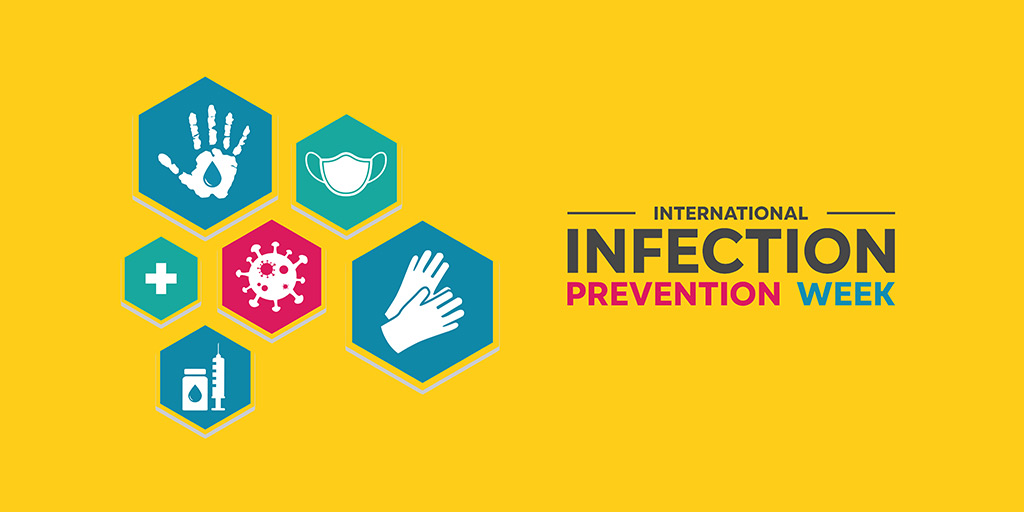Infection Prevention Week 2025: Breaking the Chain of Infections

Every year, millions of people worldwide are affected by infections that could have been prevented with simple hygienic measures. From respiratory illnesses such as flu to hospital-acquired infections, these conditions place a heavy burden on families and healthcare systems. In India, the challenge is even greater, with overcrowded hospitals and limited awareness often leading to avoidable infections. The good news is that solutions are within reach. Simple measures such as regular handwashing, timely vaccination, and safe hygiene practices can save countless lives. International Infection Prevention Week 2025 serves as a reminder that prevention begins with awareness and action.
In this article, we will explore why infection prevention matters, the common infections that can be avoided, and the strategies that protect both hospitals and homes. Let us begin by understanding the need for such an initiative.
Table of Contents
ToggleImportance of Infection Prevention in Healthcare and Daily Life
- In India each year, about 2 million people get healthcare-associated infections (those caught in hospitals) causing around 80,000 deaths.
- Drug-resistant infections (when germs no longer respond to antibiotics) cause nearly 300,000 direct deaths in India annually.
- Globally, antimicrobial resistance (AMR) is a growing threat. Without strong prevention, millions more could die by 2050 from infections that we used to treat easily.
These numbers underline why infection prevention is essential – not only in hospitals but also in homes, schools, workplaces, and public spaces. By making hygiene practices, vaccinations, and safe behaviour part of daily life, communities can save lives and reduce long hospital stays, high costs, and preventable suffering.
What is International Infection Prevention Week?
International Infection Prevention Week (IIPW) is observed every October to raise global awareness about the importance of stopping the spread of infections. Launched in the mid-1980s by the Association for Professionals in Infection Control and Epidemiology (APIC), the initiative has now grown into a worldwide movement supported by leading organisations, including the World Health Organization (WHO).
The campaign encourages communities, healthcare workers, and policymakers to adopt effective infection prevention practices such as hand hygiene, vaccination, sterilisation, and safe hospital protocols. Its core purpose is to reduce preventable infections and empower both individuals and healthcare systems to create safer environments.
Theme of International Infection Prevention Week 2025
For International Infection Prevention Week 2025, the official theme announced by Infection Prevention & You (APIC) is “Stand UPPP for Infection Prevention.”
UPPP stands for:
- Unite: Everyone, healthcare workers, patients, and communities, working together.
- Prevent: Taking simple steps such as handwashing, vaccination, and safe hygiene.
- Protect: Paying special attention to vulnerable groups like children, the elderly, and those with weak immunity.
- Prevail: Staying prepared and overcoming infection challenges through collective effort.
The theme is a reminder that infection prevention is not just the responsibility of hospitals but a shared commitment that starts at home and extends to the community. Simply put, small actions taken today can prevent infections tomorrow.
What Are the Most Common Infections That Can Be Prevented?
Many infections can be avoided with timely precautions and proper hygiene. Some of the most common ones include:
Respiratory infections
Conditions such as COVID-19, influenza, and tuberculosis spread mainly throughcoughing, sneezing, or close contact. Vaccination, mask use when needed, and good ventilation help reduce risks.
Urinary tract infections (UTIs)
UTIs are common, especially among women, and often caused by bacteria entering the urinary tract. Drinking enough water, maintaining good hygiene, and timely medical care are key to prevention.
Surgical site infections
These occur when germs infect the site of a recent surgery. Sterile equipment, safe surgical practices, and hospital infection control protocols reduce their occurrence.
Skin and soft tissue infections
Bacterial or fungal infections on the skin can spread quickly. Regular handwashing, keeping wounds clean, and avoiding sharing personal items can lower risk.
Best Infection Prevention Strategies Recommended by Experts
Preventing infections does not always require advanced technology, simple and consistent practices can make the biggest difference. Experts from the World Health Organization and Infection Prevention & You recommend the following strategies to prevent infection:
Hand hygiene and proper handwashing techniques
Wash hands with soap and water for at least 20 seconds, especially before meals, after using the toilet, or after returning home from outside. When soap is not available, use an alcohol-based sanitiser.
Use of sanitisers and personal protective equipment (PPE)
Masks, gloves, and other protective gear help reduce exposure to germs, especially in hospitals or crowded spaces. Change masks regularly and avoid reusing single-use PPE.
Cleaning and disinfecting surfaces
Frequently touched items such as doorknobs, switches, phones, and kitchen counters should be cleaned regularly. Wash fruits and vegetables before eating to prevent foodborne infections.
Vaccination as prevention
Vaccines remain one of the strongest defences against infections such as influenza, COVID-19, and hepatitis. Following the recommended immunisation schedule helps protect both individuals and communities.
The Role of Hand Hygiene in Infection Prevention
Hand hygiene is one of the simplest and most effective ways to prevent the spread of infections. According to the World Health Organization, proper handwashing can cut healthcare-associated infections by up to 50%.
Clean hands stop germs from moving from one person to another, whether through direct contact, touching surfaces, or handling food. In hospitals, hand hygiene among doctors, nurses, and staff is critical for protecting vulnerable patients. In daily life, it prevents common illnesses such as colds, flu, and stomach infections.
Handwashing Guidelines
WHO recommends washing hands with soap and water for at least 20 seconds. Here are the key steps:
- Wet hands with clean running water and apply soap.
- Rub palms together, then clean the back of both hands.
- Scrub between fingers and under nails.
- Clean thumbs and wrists thoroughly.
- Rinse well and dry with a clean towel or air dryer.
When soap and water are not available, alcohol-based sanitisers can be used as an effective alternative. Regular awareness campaigns, such as those led by Infection Prevention & You, continue to remind people that clean hands save lives.
Infection Prevention in Hospitals
Hospitals follow strict infection prevention and control measures to protect patients, staff, and visitors. These are system-level practices designed to stop infections from spreading within healthcare facilities. Common infection prevention strategies used by hospitals include:
Infection Control Committees
Most hospitals have dedicated committees that monitor infection trends, enforce guidelines, and ensure that staff follow safe practices.
Isolation Protocols
Patients with contagious diseases are placed in separate wards or isolation rooms to prevent cross-infection. Clear signage, restricted entry, and specialised protective gear are used in these areas.
Safe Injection Practices
Hospitals emphasise the use of sterile needles, single-use vials where possible, and strict protocols for handling sharps to reduce infection risks.
Sterilisation of Equipment
Surgical tools and medical devices are sterilised using heat, chemicals, or advanced autoclaving techniques to eliminate harmful microbes.
Role of Doctors and Nurses
Healthcare staff play a central role by following hand hygiene, using PPE correctly, and educating patients about infection prevention during treatment and recovery.
Awareness Programs and the Role of Hospitals
Hospitals play a key role in raising awareness about infection prevention. Many conduct educational drives, organise public talks, and run campaigns to promote safe practices such as hand hygiene, vaccination, and the correct use of protective equipment. Community initiatives also include health camps, school programmes, and workplace training sessions that teach people how to prevent infections in everyday life.
At Graphic Era Hospital, Dehradun, infection prevention is central to patient safety. As an NABH- and NABL-accredited institution, we follow rigorous national standards for hygiene, safety, and clinical care. Our hospital has dedicated infection control teams, strict sterilisation protocols, and ongoing awareness programmes to educate patients and their families. We combine advanced medical technology with community outreach so that prevention is not limited to treatment rooms, it extends into homes and across the wider community, protecting lives and building stronger health for all.
Infection Prevention at Home, in Schools, and Public Spaces
Infection prevention does not stop at hospitals, it continues in homes, classrooms, offices, and public places. Small everyday habits can make a big difference in reducing the spread of germs.
At Home and in the Community
- Wash hands before meals and after using the toilet.
- Cook food thoroughly and wash fruits and vegetables.
- Cover coughs and sneezes to prevent the spread of seasonal flu.
- Use masks in crowded or high-risk settings when needed.
In Schools
- Encourage children to wash hands regularly, especially before eating.
- Keep classrooms clean and ensure shared items such as toys are sanitised.
- Teach children to cover their mouths while coughing or sneezing.
In Offices and Workplaces
- Maintain clean workspaces and disinfect commonly touched surfaces.
- Encourage sick employees to rest at home to avoid spreading infections.
- Provide access to sanitisers and promote vaccination drives.
In Public Spaces and During Travelling
- Practise hand hygiene after using public transport.
- Wear masks in congested areas.
- Avoid touching the face after contact with public surfaces until hands are washed.
Together, these measures reduce the risk of infections and create safer environments for everyone.
Conclusion: Infection Prevention Starts With Small Steps
Infections remain one of the most common yet preventable health challenges worldwide. Simple actions such as proper hand hygiene, safe food handling, timely vaccination, and hospital infection control practices can save countless lives. International Infection Prevention Week 2025 is a reminder that prevention is everyone’s responsibility – from hospitals that follow strict protocols to families that practise good hygiene at home. Small, consistent steps build stronger communities and help fight the growing threat of antibiotic resistance.
To learn more about infection prevention or to contact a specialist at Graphic Era Hospital, Dehradun, call at 1800-889-7351.
Frequently Asked Questions
What is International Infection Prevention Week?
International Infection Prevention Week (IIPW) is observed every October to raise global awareness about preventing the spread of infections. The campaign highlights the importance of hand hygiene, vaccination, and safe hospital practices.
Why is infection prevention important in hospitals?
Infection prevention protects patients, doctors, nurses, and visitors from healthcare-associated infections. It reduces hospital stays, lowers costs, and improves overall patient safety.
What are the top 5 ways to prevent infections?
The most effective ways include proper hand hygiene, vaccination, safe food handling, cleaning and disinfecting surfaces, and using protective equipment when needed.
Can hand sanitisers completely replace handwashing?
No. Hand sanitisers are effective when soap and water are not available, but handwashing is better at removing dirt, grease, and certain germs.
How do hospitals in Dehradun manage infection prevention?
Hospitals in Dehradun, including Graphic Era Hospital, follow strict infection control measures such as sterilisation, isolation protocols, safe injection practices, and staff training to reduce infection risks.
What is the role of nurses in infection control?
Nurses ensure safe patient care by practising proper hand hygiene, using PPE, monitoring for infection risks, and educating patients and families about prevention.
How can schools and offices prevent the spread of infections?
Schools and workplaces can promote hand hygiene, keep shared spaces clean, encourage sick individuals to stay home, and support vaccination drives.
What infections can be prevented with vaccines?
Vaccines can prevent serious infections such as influenza, COVID-19, hepatitis, measles, HPV, and whooping cough.
How can I protect my family from seasonal flu?
Annual flu vaccination, good hand hygiene, covering coughs and sneezes, and staying home when unwell are the best protective steps.
Where can I find infection prevention programs near me?
Infection prevention programs are available at hospitals, community health centres, and through awareness campaigns organised during International Infection Prevention Week.
What is the theme of International Infection Prevention Week 2025?
The theme for 2025 is “Stand UPPP for Infection Prevention” as announced by Infection Prevention & You (APIC). It stands for Unite, Prevent, Protect, and Prevail.
How can infection prevention reduce antibiotic resistance?
By stopping infections before they start, the need for antibiotics decreases. This reduces misuse and slows the spread of drug-resistant bacteria.
By Specialities
- Bariatric Surgery
- Cancer Care
- Cardiology
- Dental
- Dermatology
- Diabetes & Endocrinology
- Endocrinology and Diabetes
- ENT (Ear Nose Throat)
- Eye Care
- Gastroenterology
- Haematology
- Health Awareness
- Health Care
- Health Tips
- Hematology
- Hepatology
- Internal Medicine
- Mental Health and Behavioural Sciences
- Metabolic
- Neonatology
- Nephrology
- Neurology
- Nutrition & Dietetics
- Obstetrics & Gynaecology
- Oncology
- Ophthalmology
- Orthopaedics
- Paediatric
- Physiotherapy & Rehabilitation
- Plastic and Reconstructive Surgery
- Psychology
- Pulmonology
- Rheumatology
- Spine
- Urology
Recent Posts
- A Complete Guide to Blood Clots in the Brain
- Heart Attack: Symptoms and Treatment
- World Obesity Day 2026: Understanding, Preventing, and Managing Obesity
- Bacterial and Viral Pneumonia: Causes, Symptoms, and Treatment Options
- World Hearing Day 2026: Empower Yourself to Protect and Improve Your Hearing
Need expert medical advice?
Share your details and our healthcare specialists will reach out to assist you.
By proceeding, you acknowledge and agree to our Privacy Policy, Terms of Use, and Disclaimer.



















